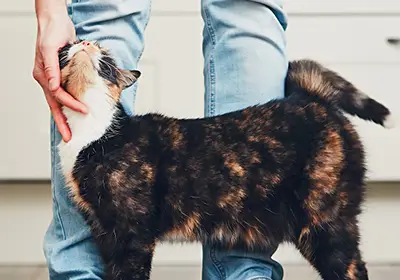Latest news from Garston Veterinary Group
Read on for a host of preventative pet care news that is free and updated monthly. In the articles below you’ll find seasonal advice, local tips and other information on how to keep your pet healthy, as well as interesting ways to exercise and entertain them.

- Details
We all want to include our pets during the Christmas festivities and treating them to something special isn’t uncommon. Read below for guidance on safe, pet-friendly foods you can give your pet this Christmas.

- Details
The question of whether to put a bell on your cat's collar sparks a lot of discussion among cat owners, and for good reason! There's no single right answer; what's best depends on your cat's unique personality, lifestyle, and your home environment.

- Details
A dedicated client care team at a group of veterinary practices across Wiltshire and Somerset have been recognised for their outstanding levels of service.

- Details
We believe that pet insurance is an important part of responsible pet ownership in Frome, Melksham, Trowbridge, Warminster and Westbury. Owning a pet is hugely rewarding, but it can also be expensive if they are to suffer an illness or injury.

- Details
As a pet owner, you build strong relationships with your vets, who play a crucial role in keeping your pets healthy and happy. However, circumstances can change, and for various reasons, you may decide to look for a new veterinary practice for your pets' care. This process is completely normal, and we hope the information below will be helpful to you.

- Details
Our long-established vet practice serving Somerset and Wiltshire has earned a prestigious national environmental award recognising its drive to cut waste and increase sustainability.

- Details
The Christmas season brings joy, decorations, and Christmas trees into our homes. However, as a pet owner, it's crucial to know if these festive additions are safe for our dogs. At Garston Vets, we often get asked, "Are Christmas trees toxic to dogs?" The answer is yes, certain aspects of Christmas trees can pose risks to dogs.
This blog explores why dogs might find Christmas trees enticing, why they can be toxic, and how to keep your dog safe during the Christmas season.

- Details
Pets, much like humans, can experience anxiety. Recognising and addressing this anxiety is crucial for their wellbeing. At Garston Vets, we understand the challenges of managing anxious pets and are here to provide you with practical advice to help soothe your anxious dog or cat.
This blog will explore what makes dogs and cats anxious, how to manage their anxiety, and offer tips for keeping them calm.

- Details
Travelling with your dog can be an exciting adventure, but it requires some planning to ensure a smooth journey for both you and your dog. Whether you're embarking on a road trip, flying to a new destination, or simply heading to Garston Vets for a check-up, preparing your dog adequately is key to a stress-free experience. Here, we share some top tips to make sure your dog is travel-ready and comfortable throughout your journey.

- Details
If your pet has been to see the vet and they have been given a treatment plan, you may want to continue this at home to ensure your pet’s ears fully recover. Our guidance on caring for your pet’s ears below is based on post-treatment and after your pet has had a full examination on their ears.

- Details
Treats and Hidden Threats: Protecting Your Dog from Xylitol Poisoning
We love sharing the good times with our dogs, and sometimes that means indulging them in a special treat from time-to-time.
However, together with the fun, it's crucial to be aware of hidden dangers that can be in seemingly harmless snacks. One of those dangers is xylitol, a sugar alcohol commonly used as a sweetener in many everyday products, which is perfectly safe for humans, but extremely toxic to dogs, even in small amounts.
This blog post aims to provide you with the knowledge to keep your dog safe from xylitol poisoning. We'll delve into what xylitol is, why it's dangerous for dogs, the signs and symptoms of poisoning, and the crucial steps to take if you suspect your dog has ingested xylitol.

- Details
Understanding the impact of stress on your pet’s health
We all know stress can take a toll on our health, but did you know it can also significantly impact your pet’s wellbeing? Just like us, pets experience stress and anxiety in response to various situations. Chronic stress, however, can have a detrimental effect on your pet’s physical and mental health.


